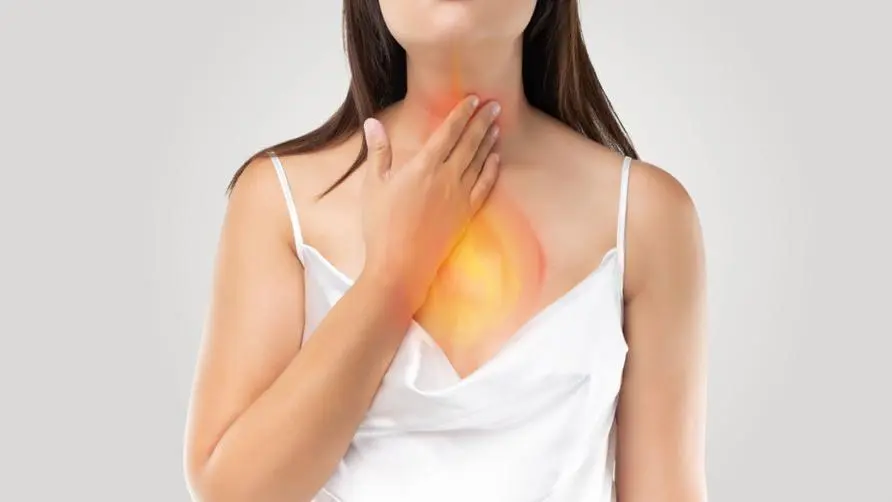What to do about gastroesophageal reflux? Can nutritional intake be improved? Avoid 6 Mine Foods

Typical symptoms of gastroesophageal reflux
Gastroesophageal reflux (Gastroesophageal reflux), as the name suggests, is the upward movement of stomach contents into the esophagus after meals. Normally, this phenomenon rarely occurs during sleep at night; in infants, children and adults, it is considered a normal and short-lived physiological phenomenon as long as it does not cause any discomfort, esophageal burns or any complications.
The prevalence of gastroesophageal reflux disease in Taiwan is on the rise. According to statistics, it has risen to 28% in the past two decades, an increase of more than five times. On average, one in four people is seriously affected. What are the symptoms of gastroesophageal reflux disease? The two typical symptoms of gastroesophageal reflux disease in adults and older children are heartburn and regurgitation.
Heartburn usually occurs after meals, and patients subjectively feel a burning sensation behind the sternum. Food reflux is when a small amount of food in the patient’s stomach is combined with acidic substances and moves upward into the mouth or lower part of the throat.
Other possible symptoms include difficulty swallowing, chest pain, heartburn, globus sensation or odynophagia; rarely, it may even cause chronic coughing and wheezing.
Extended reading: [Expert Q&A] What are the symptoms of gastroesophageal reflux? How to treat it? Is it helpful to take stomach medicine? “Group 2 foods” to avoid
Drug treatment of gastroesophageal reflux
Drug treatment of gastroesophageal reflux disease Currently, antacids, alginates, and histamine-2 receptor antagonists are available for drug treatment of gastroesophageal reflux disease. For patients with severe or persistent symptoms, consider giving proton pump inhibitor (PPI). The key point is that severe patients may develop severe erosive esophagitis. After complete treatment, follow-up gastroscopy is still required.
In terms of daily health care, patients with mild or intermittent symptoms should first focus on lifestyle correction, such as reducing psychological stress, losing weight, not eating three hours before going to bed, raising the head of the bed when sleeping, and avoiding special foods, such as: Except for chocolate, caffeinated drinks, greasy food, spicy food, carbonated drinks and mint, avoid smoking, alcohol and wearing tight clothing, chewing gum or taking lozenges to swallow saliva frequently to neutralize gastric acid, and practice abdominal breathing to strengthen the lower esophagus Sphincter strength, etc., are all effective.
Nutritional supplementation for gastroesophageal reflux
If you want to supplement additional nutrients, you can first consider Omega-3 fatty acids, vitamin C, vitamin D and probiotics depending on your child’s testing status. The helpful nutrients are as follows:
Melatonin was discovered to treat gastroesophageal reflux disease.
Ginger has also been found to improve gastroesophageal reflux and indigestion symptoms in children. Ginger can also promote gastric emptying in adults.
Glycyrrhetinic acid in licorice was discovered, and when used together with drugs, it has a additive effect on the treatment of gastroesophageal reflux disease.
The ingredients in chamomile are thought to make antacid and relieve stomach discomfort.
Experiments have confirmed that fish oil is effective in treating esophageal inflammation caused by gastroesophageal reflux.
A heavyweight journal has confirmed that probiotics can directly improve gastroesophageal reflux
Vitamins A, C, and E have been found to not only prevent gastroesophageal reflux disease, but also prevent complications caused by gastroesophageal reflux disease. Beta-carotene has been shown to reduce the symptoms of gastroesophageal reflux disease. Quercetin, plant flavonoids and vitamin E can relieve esophageal inflammation caused by gastroesophageal reflux disease.
Oxidative damage is the pathological mechanism of esophageal inflammation caused by gastroesophageal reflux disease. Therefore, if you supplement antioxidants such as thione, you can reduce esophageal inflammation.
Lycopene can also reduce esophageal inflammation caused by gastroesophageal reflux disease through the same antioxidant mechanism.
Barrett’s esophagus, a precancerous esophageal disease caused by gastroesophageal reflux disease, generally has low levels of vitamin D in the blood of patients.
Patients who use hydrogen ion pump blockers for a long time to treat gastroesophageal reflux disease should pay attention to the possibility of iron deficiency anemia and give iron supplements if necessary.
Research has confirmed that tryptophan can prevent esophageal inflammation caused by gastroesophageal reflux disease.
Further reading:





